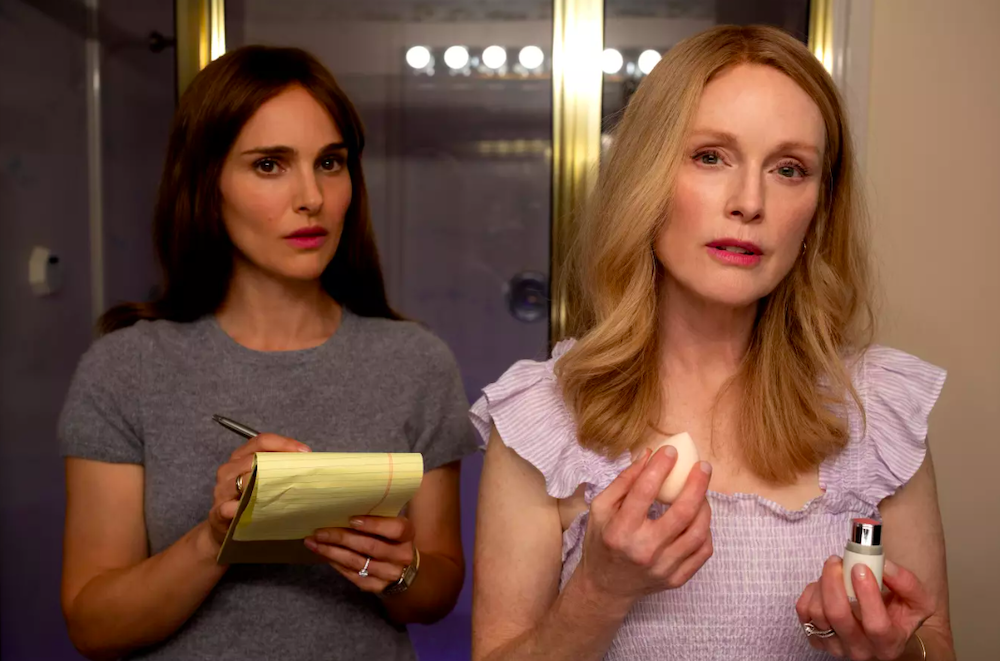In Netflix’s ‘May December,’ things get a little meta as we watch an actress playing an actress playing a character based on a real person played by an actress. Much like this dynamic, the characters in the movie also go through a complex mix of emotions as two decades-old skeletons are dug up, and everyone is forced to confront their own nature in the midst of it. Natalie Portman’s Elizabeth Berry becomes the catalyst that stirs the reaction between Gracie and Joe, who are partially based on real-life people. Does this mean that Elizabeth Berry is also based on a real person?
Elizabeth Berry is a Deeply Layered, Fictional Character

Directed by Todd Haynes, ’May December’ is based on a screenplay by Samy Burch, who wanted to explore “this tabloid culture of the 90s” that has developed into society’s obsession with true crime through a fictional lens. Her intention was “to question that transition and why we want to keep recreating those stories,” and that’s where Elizabeth Berry comes in. She is a fictional Hollywood actress, made to serve as the audience’s entry point into Gracie and Joe’s scandalous romance, but as the events unfold, she is revealed to be quite a complex, somewhat morally gray character, too.
Burch didn’t want Gracie or Elizabeth to come out as good or bad, she didn’t want the audience to have a clear perspective of who they were and whether they were redeemable. She wanted to “give the viewer a comparable place to interrogate what they were watching. But I also felt it was really important that there was an element of pleasure in doing so: that it made you uncomfortable, but there was an excitement.”
In bringing the character to the screen, Portman was aware of the complexity that the multi-layered nature of the role would require. She had extensive conversations with director Todd Haynes and Julianne Moore, who plays Gracie. Ultimately, Portman had to play an actress, and it was easier because she had spent her “whole life researching how to be an actress.” “When you explore all those layers, playing someone who’s playing someone, making a movie of a movie in a movie, there are so many layers of artifice, and what truth we can get out of artifice, which is the kind of alchemy of what we do,” Portman said.
The Academy Award winner confessed that a lot of heavy lifting lay on Moore, who had “to establish a sort of physical type that Natalie’s character has to start to imitate throughout the course of the film.” Revealing the roadmap they created for the characters, Portman said: “We talked the most about how performative she would be when we first meet her. As an actress coming into this space of a small town, there’s a kind of expected way to do it, where it’s this persona entering the room. But I think we talked a lot about playing against that and making her someone that you can trust and can go on this journey with, and then you only start to question later on.”

According to Todd Haynes, Portman leaned into the gray area of Elizabeth’s character, the one that becomes invested to the point of being vampiric in Gracie’s life. The director said: “[Portman] was really ballsy about wanting to invite those readings into the movie. The incredible sense of disquiet that the script presented to her as a reader.” Julianne Moore added subtle distinctive features to Gracie (like the lisp), which are later adopted by Elizabeth as the filming for the movie begins.
“We were calling it the ‘princess syndrome.’ The whole way that Joe’s character is drawn as somebody who is going to rescue the damsel, the princess, who is living in a kind of discontent in her domestic life. It’s almost like a corrupt, twisted kind of fairy tale. And it was driven by Julianne. It was her insistence in looking back at that source material,” Haynes said of Moore’s approach towards Gracie.
In the movie, we watch Portman’s Elizabeth slowly transforming herself into Gracie, doing whatever she can to have the experience that Gracie would have had, to become her rather than see things from her perspective, and this is where the lines that mark morality and reality start to blur. “We’re using lies to tell the truth, and it’s magic. Most artists who tell stories want to hold up their ethical standpoint in the light. It can be vampiric to take human emotion and human story and capitalize on it and tell a story,” Portman said, underlining her character’s intentions regarding capturing Gracie. Considering all this, we can say that while Elizabeth Berry might be a fictional element in ‘May December,’ the writer, the director, and the actress have brought their own sensibilities to create a three-dimensional character that feels utterly real.
Read More: May December: Are Gracie and Joe Still Married in Real Life?


You must be logged in to post a comment.